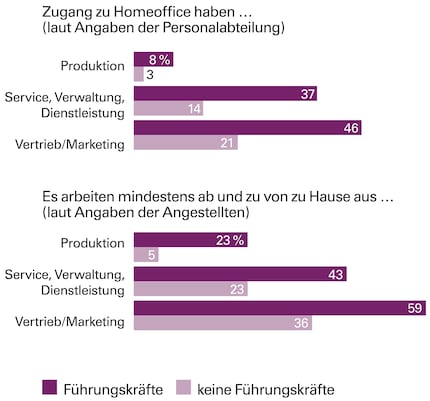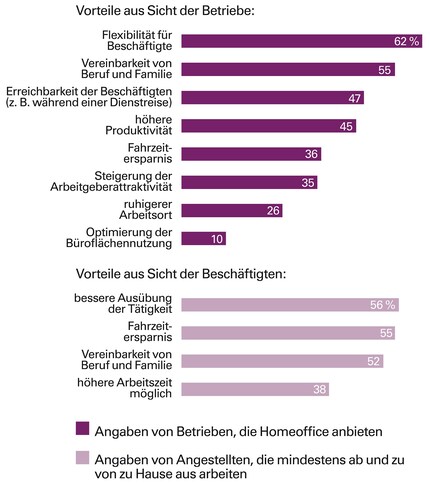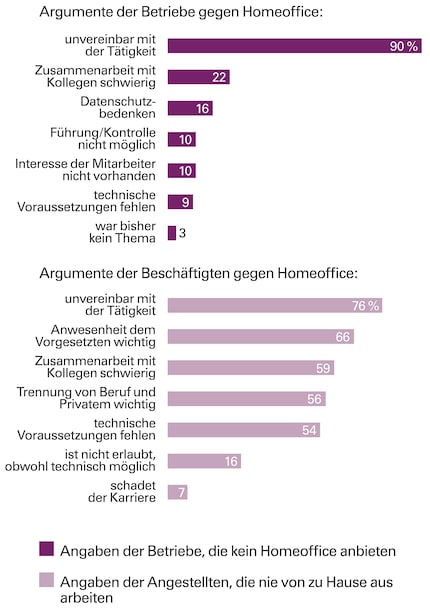
Background information
Really, Pokémon’s just getting worse? You couldn’t be further from the truth!
by Cassie Mammone

Many employees would like to work from home on a regular basis. However, managers and colleagues are often sceptical. Recent studies show when everyone benefits from a home office arrangement.
"Working from home makes you unhappy!" These or similar headlines appeared in many daily newspapers in September 2019. This was triggered by the latest results of a survey by the AOK health insurance fund: According to it, employees who work at home are more exhausted, nervous and irritable. They suffer more from self-doubt and feel anger and annoyance more often - compared to employees who work exclusively at the office. The reason: at their desk at home, it is more difficult to separate private life and work; this puts a strain on the psyche. Nevertheless, the number of people working at least partly from home is slowly but steadily increasing in Germany. The SPD even wants to enshrine the right to work from home in law in the medium term.
Stefanie* would also like to work from home in the afternoons in future. However, the 37-year-old advertising specialist's boss refers to the press reports to deny her request: "Read this. I'm not doing you any favours!" He also secretly fears that his employee would perform less at home and the mood in the team could suffer.
Stefanie doesn't find the newspaper articles convincing because she is already unhappy - without working from home. Her son Jannis*, who recently started school, howls and rages every day because he is tired after school and doesn't want to go to after-school care afterwards. Stefanie can't afford a nanny. She is sure that working from home would be the solution: while she works on marketing strategies at home in the afternoon, Jannis could do his homework or play in the room next door. She believes this would definitely make her feel better. And a friend of hers - without children - raves about working from home: "I often don't feel inspired in the office. Now I'm much more flexible. When the weather is nice, I sometimes sit by the lake with my laptop in the evening. That's where I get the best ideas!"
The AOK survey cannot actually answer whether Stefanie's hopes would be fulfilled. Like many other studies, it does not differentiate between the life situations of the respondents. A young mother, for example, usually works from home for completely different reasons than a manager. However, the effects on job and life satisfaction, for example, can actually be quite different: It depends on the motives for working from home, the family situation, the professional position, career aspirations and also how the employer organises the framework conditions. It is therefore worth taking a look at studies that take these differences into account. Here we present the six most important findings.
Working from home refers to forms of work in which employees carry out all or part of their work outside their employer's premises. When asked "Do you regularly work outside the company?", many employees answer "Of course!" and are therefore categorised as working from home in the statistics. However, the HR department of a company often assesses the status of their employees quite differently, as scientists from the Institute for Employment Research (IAB) in Nuremberg and the Leibniz Centre for European Economic Research (ZEW) in Mannheim found out.
The team analysed data from several thousand companies and their employees before publishing the latest results in 2019. According to the study, one in four companies in Germany officially offers its employees some form of home office. However, only one in six allows it on a regular basis - i.e. one or more days a week. The prevalence also varies greatly depending on position and activity: team leaders have access to home office more than twice as often as the rest of the workforce, and there are at least five times as many employees in areas such as sales and marketing than in production, for example (see chart "Prevalence of home office"). Many activities, such as operating machines, are simply not suitable for this.

However, significantly more employees consistently state that they work from home than is likely to be the case according to HR departments. "The reasons for this probably lie in the perception of what working from home actually is," explains Susanne Steffes, one of the authors of the IAB/ZEW study and professor at the University of Cologne. This is because HR managers only include fixed arrangements; employees, on the other hand, consider whether they regularly work for the company from home or on the road, whether as part of normal working hours or beyond.
The latter is no exception, by the way: "Our analysis shows that 44 per cent of those who say they work from home do so in their free time - in the evenings and at weekends." Home office in Germany therefore largely takes place outside normal working hours and even when there are no official regulations.
It should also be noted that working from home is not a mass phenomenon and will not become one any time soon. Only one in four to five employees work from home at least occasionally. And of those who never work outside the company, two thirds have no intention of changing this.
Most employees say they can concentrate better at home and therefore get more done. According to the IAB/ZEW, 45 per cent of employers who allow employees to work from home take a similar view. This indicates a solid basis of trust - or that the employee's performance can also be easily assessed remotely.
Conversely, however, more than half of companies apparently offer remote working for other reasons. According to the survey, between 50 and 60 per cent recognise advantages in their employees being able to work more flexibly or better balance work and family life. Slightly more than one in three entrepreneurs also believe that this offer would make their own company more attractive as an employer (see chart "Positive experiences with working from home").

In 2018, researchers from Stanford University took a closer look at the economic consequences of working from home in a controlled study. A large Chinese travel agency in Shanghai with around 10,000 employees was looking for ways to maximise profits. One of the ideas was to save office space. The CEO therefore launched a test balloon: first, 250 call centre employees in the company were identified who were interested in a temporary home office experiment. It was decided by chance which of them would then make calls at home four days a week for the following nine months; the other half had to continue working in the open-plan office. All participants followed exactly the same workflow and answered incoming customer requests in the same shift, from 9 am to 5 pm. "In this way," say the researchers, "the two groups really only differed in terms of where they worked."
The result exceeded the boldest expectations. The productivity of the home office workers was a whopping 13 per cent higher than that of the control group! Incidentally, there were no "frustration effects" in the latter group, as a performance comparison with the rest of the workforce showed. On the one hand, the home office group took fewer breaks and called in sick less often, which increased their net working time by nine per cent. Secondly, the telephone workers at home completed more calls in the same amount of time. Even more interesting: the otherwise very high fluctuation rate among call centre employees fell by half - which saved a lot of training costs!
The enthusiastic CEO then offered all telephone operators a home office arrangement. However, almost half of the employees who had been happy about their luck of the draw in the first experiment now preferred to work exclusively at the company. They cited "social" reasons for their decision. They missed the contact with colleagues and their moral support when dealing with difficult customers. As a result, everyone was given a free choice, which actually increased productivity by around 25 per cent.
This conclusion is suggested by studies worldwide. Strangely, many newspapers did not report that job satisfaction was also higher among home office workers in the AOK study mentioned at the beginning. Most of them perceived their work as more self-determined and stated that they could manage more work at home. In contrast, IAB/ZEW differentiated between four groups in their most recent analysis: Those who were allowed to work from home during normal working hours were the most satisfied with their job. However, those who worked exclusively in the office of their own free will were almost as positive. Employees who only worked from home in their free time were a little less enthusiastic. By far the most dissatisfied were employees with an unfulfilled desire to work from home - this currently affects one in nine employees.
It must also be taken into account that marital status also influences job satisfaction. A team led by Melanie Arntz, also at ZEW, therefore analysed the data of around 7,600 working men and women in Germany. The result: employees without younger children (under the age of 16) are more likely to work overtime when working from home. Nevertheless, they are slightly more satisfied with their job. They obviously appreciate the flexibility of being able to work from home when needed.
For parents, on the other hand, working from home often goes hand in hand with an increase in the contractually agreed number of hours, especially for women. Mothers in particular (less often fathers) use this arrangement to increase their working hours and earn more as a result. "This reduces the income differences between spouses," emphasises Melanie Arntz, a professor at the University of Heidelberg. Nevertheless, the bottom line is that "home office parents" were not noticeably happier with their employees than "office parents".
There may be various reasons for this. According to Arntz, it is striking that the hourly wage of mothers working from home - in contrast to that of fathers - often does not increase. It is possible that they are less likely to ask for a pay rise. In addition, parents who work at home during normal working hours are in the office significantly less than others, which can have a detrimental effect on their career. "The presence culture is still firmly anchored in many places," confirms Steffes. Some people may come to the bitter realisation that working from home has sidelined them in terms of their career.
Satisfaction with employees plays a major role in well-being, but of course it is not everything. Several surveys, similar to the AOK study, suggest that employees working from home are more stressed than others, despite increased job satisfaction. However, conclusions should be drawn with caution. On the one hand, the studies are contradictory. Employees of Eurofound (the European Foundation for the Improvement of Living and Working Conditions), for example, analysed a large number of surveys in 28 nations: Overall, a clear stress effect could only be demonstrated for employees who spend a lot of time working for the company while travelling. The authors were unable to identify any clear differences for those who work at home or only occasionally on the move.
Many home office studies suffer from the fact that they do not differentiate between the various groups and their respective motives
Obviously, when it comes to well-being, individual circumstances are extremely important. It is undisputed that working from home can have both positive and negative effects on the psyche. On the one hand, a corresponding arrangement allows many employees to increase the number of hours they work and thus their income. This lifts the mood. On the other hand, longer working hours usually go hand in hand with more effort and less rest.
If entire days are spent working from home, this not only saves on travel costs, but also a huge amount of travelling time, depending on where you live and work. The hours saved in this way are one of the most important motives. The risk: you don't get out of the house. Some may even feel isolated and complain that the ceiling is falling on their heads.
If you can split your working hours when working from home, shopping, housework and doctor's appointments can be squeezed in between - another advantage. Family commitments, such as cooking lunch for the children, helping with homework or quickly checking on grandma, can be better integrated. And in countries where outsourcing childcare is not common, working from home may be the only way to reconcile family and career.
The downside: the lack of physical distance between private life and work inevitably harbours the risk of mixing the two in terms of time and thought. Employees who are able to work from home have been shown to work more overtime, find it harder to stop when a task has not yet been completed and are less able to switch off. Mothers who work at home also tend to take on childcare themselves rather than delegating it to others, which naturally means that family and work are more likely to clash.

The disadvantages probably often outweigh the advantages. Perhaps this explains why Arntz's team in Germany found hardly any differences between office and home office workers in terms of life satisfaction. The only exception was childless men working from home: they were significantly more satisfied with their lives.
The list of positive and negative effects could go on and on, and it's obvious that they will have different effects depending on your personal situation. Stefanie's boss shouldn't turn down her request lightly: after all, employees with an unfulfilled desire to work from home are among the unhappiest - and their well-being can improve the most despite possible disadvantages. It is much more important to find out how the negative effects can be reduced. Highlighting this need was also the actual intention of the AOK when it presented its findings. "Flexible working conditions have many advantages. It is important to organise them in a way that promotes health," explains Helmut Schröder from the Scientific Institute of the AOK.
According to a study by Tanja van der Lippe and Zoltán Lippényi at Utrecht University, whether working from home has a negative impact also depends on the employer. Especially when working from home replaces time spent in the office, employees often feel a certain scepticism from their boss. The two Dutch researchers distinguish between two contrasting corporate cultures: in "family-supportive" companies, it is a matter of course to take an employee's personal situation into account. They try to give employees the greatest possible flexibility in terms of working hours and, ideally, employees are even supported with their family obligations such as childcare or caring for relatives.
In contrast, there are companies that uphold the image of the ideal employee: This person has to be committed to the company, always shows the utmost dedication and prioritises their job absolutely in their life. Overtime and weekend work are particularly common in this environment. In fact, the Dutch research team found in 2018 that parents working at home who believe they have to fulfil these expectations experience more conflicts between their private and professional lives when working from home. The negative effect on men is even greater than on women: The stronger sex is more likely to be expected to put work first.
Another factor that the boss can influence is the mood in the team. According to the IAB/ZEW survey, only around 22 per cent of employers believe that working from home has a negative impact on cooperation between their employees. Among employees, however, the figure is around 60 per cent, and among those working from home themselves, one in five still believe this. It becomes critical when the team fears that it has to compensate for the absence of a colleague. It is therefore important to address and dispel such reservations.
Exceptions quickly generate envy. Van der Lippe and Lippényi assume that the more people in a department work from home, the more mutual understanding they will have for each other. In any case, women in their study reported fewer conflicts between family and work when other colleagues were also allowed to work from home. It may therefore help to offer all team members at least a limited home office workload.
A number of studies show, according to the Eurofound overview: Employees with the home office option are happier, healthier and have fewer work-life balance problems if they can determine to a large extent when and where they work in the process. However, this only works as long as they do not overshoot the mark, i.e. regularly work overtime. According to an EU directive, working hours should not exceed 48 hours per week, including overtime. It is also important to remember that working from home must always be a voluntary agreement for both sides. If the line manager is not fully behind the agreement, it will not be a success story.
Countless advice pages can be found on the internet explaining how to optimise your home office. This ranges from decorating suggestions to the right lighting and technical equipment to rules of behaviour. From an ergonomic point of view, every workplace where you spend many hours should actually fulfil the same standards as in the company - including a sensible table and a good desk chair. There are hardly any scientific studies on the various behavioural tips. However, it certainly makes sense to plan personal meetings every now and then or to use the times when you are in the office more for "networking". Sometimes it is advised to communicate work progress to your line manager as often as possible or to request regular feedback meetings. Others suggest adapting the work rhythm to your own performance peaks, but always reporting longer breaks so that no misunderstandings arise. However, the associated flood of messages could also annoy colleagues and bosses. It is best to discuss mutual expectations as precisely as possible.
Above all, employees working from home should take the opportunity to actively organise their work-life balance. Numerous studies suggest that they need more self-discipline - not so much to work as to stop! Those who are allowed to work from home should realise that it is not only they who benefit, but also their employer, especially in terms of flexibility during peak times and productivity. All too often, working from home is treated as a privilege, with the result that employees think they now have to work extra hard. But if you make a careful note of your working hours, you don't need to have a guilty conscience. Conclusion: Whether you are happy working from home is largely in your own hands. With self-determination comes personal responsibility.
We are partners of Spektrum der Wissenschaft and want to make well-founded information more accessible to you. Follow Spektrum der Wissenschaft if you like the articles.
[[small:]]
Experts from science and research report on the latest findings in their fields – competent, authentic and comprehensible.
Practical solutions for everyday problems with technology, household hacks and much more.
Show all